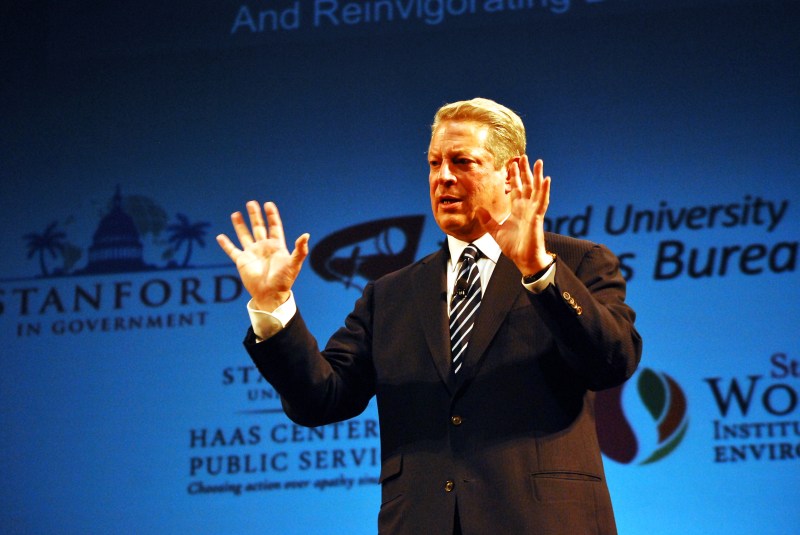Former Vice President Al Gore pulled no punches in a 45-minute speech in Memorial Auditorium on Tuesday evening, calling on students to “change the conversation” around climate change and reclaim a democracy that has been “hacked” by the wealthy and special interests.
“Change often comes quickly, when consciousness changes,” Gore said, referencing shifts in public opinion on issues like civil rights, gay marriage and even technological advances. “We have to become conscious of the fact that our home is in profound danger… We are destroying the climate balance and destroying the ecological integrity of the earth.”
The sold-out speech was the first annual Stephen Schneider Memorial Lecture, named after the late Stanford biology professor who, as part of the Intergovernmental Panel on Climate Change, was named co-winner– with Gore– of the 2007 Nobel Peace Prize.
Schneider, who passed away unexpectedly in 2010, was featured in a video before Gore’s speech. The two touched on similar issues, especially Schneider’s principal cause in his later life: the better communication of scientific information for policy change.
“This is not just an academic exercise, this is something we need to have people deeply engaged in,” Schneider said in a speech delivered to Climate One, an environmental advocacy group. “We’ve got to take back the airwaves in some way and make sure that what we’re hearing is credible.”
Gore spent some time discussing the planet’s current climate situation but reserved most of his wrath for special interest groups, which he argued contaminate the news media and paralyze the political system.
“What if I told you that after [the Sept. 11 terrorist attacks], we sought revenge by sending hundreds of thousands of soldiers to occupy a country that had nothing to do with the attack?” he asked to applause. “A country that just happens to have a lot of oil?”
Speaking without notes and pacing across the stage, Gore elaborated.
“I know [Iraq] is a lot more complicated than that, but it’s really not,” he said.
In tracing the causes behind Congress’ failure to tackle climate change, Gore pointed the finger squarely at corporations and interest groups.
“Corporations are increasingly demanding of quid pro quos,” he said. “The average congressman spends an average of five hours a day on the phone and at cocktail parties begging rich people and corporations for money.”
Gore used a number of current events to argue his case, referencing Congress’s recent failure to pass a bill legislating background checks on gun purchases despite polls showing an overwhelming majority of Americans as supportive.
On current environmental issues facing the United States, Gore was dismissive of much of the discourse surrounding perceived solutions.
“The tar sands? Please,” he scoffed. “When I was in Alberta a few years ago, I was asked… ‘Should we use [the tar sands]?’ And I said, ‘Well, junkies use veins in their toes when the ones in their arms and legs give out.'”
Even more detrimental, according to Gore, is the manipulation of the media by businesses.
“The airwaves are filled with ads for ‘clean coal’ and Exxon Mobil ‘solving it,’ whatever ‘it’ is,” he said. “When you see those ads to clean coal, they’re not designed to get you to turn to your dormmate and say, ‘Lets go down to the store and get some clean coal.’ They’re designed to condition political thinking.”
As he neared the end of his speech, Gore raised his voice in demanding more of Americans.
“Our democracy is in such pathetic disrepair that not a single reform [has been enacted],” he said. “Where is our pride? As Americans who believe in the majesty and integrity of democracy, it is time for us to stand up and restore it.”
Though his speech offered extensive criticisms of the political process, the media and consumerism, Gore concluded with a story suggesting that much can be changed in a short period of time.
Referring to the famous space challenge that President John F. Kennedy issued in 1962, he noted that many thought such a goal would be impossible to attain. When American astronauts landed on the moon in 1969, however, a cheer rose from the systems engineers in Houston, whose average age was 26. When Kennedy had issued the challenge, they were just 18 years old.
“You have a challenge,” Gore said to finish his speech. “I hope that you will decide to be a part of it. We need you.”
